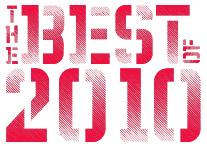Ah 2010. It's the dawn of a new decade. This year, it feels like a glut of music came out. As a result, I’m way behind in many if not most of the “big” records. So shout out to the records I haven’t gotten a chance to hear, but I’m looking forward to owning. Blueprint/Greenhouse, Kanye, Massive Attack, Arcade Fire, LCD Soundsystem, Underworld, Mark Ronson The Foreign Exchange—I’ll see you on the other side. Subsequently, my list isn’t a comprehensive weighing in on all of the 2010 releases. These are the records that stayed in rotation, the songs I obsessed over and the moments that made me wish I had a Twitter account. Okay? Now let’s go!

Contra
XL
Frankly, even I’m surprised that this record has stuck around so long for me. I wasn’t part of the first record fervor, and outside of some TV performances, I wasn’t really checking for Vampire Weekend. But I’ll be damned if the cross of indie pop and Afro-poptronica didn’t scratch an itch. Contra is an impeccable record packed with hooks galore and intricate pop craftsmanship.

King of Hearts
Definitive Jux/Fat Possum
Before I heard this record my friend Natalie declared, “The record is so good... but it’s weird as fuck!” That may be the best encapsulation of this record. King of Hearts was the solo record that SA Smash’s Camu Tao was working on before he passed away from a rare form of lung cancer. If you only knew Camu from the rowdy SA Smash or his riot inducing “Hold the Floor,” this album doesn’t make a lick of sense. But if you were lucky enough to hear 2007’s “Plot A Little”, first featured on the Def Jux/Adult Swim collaboration Definitive Swim, you could tell that he was making a hard left turn. As a result King of Hearts is a gloriously messy record that combines distorted electro-pop crooning, razor-sharp rhymes and frustratingly short instrumentals and song fragments. It’s the type of record that’ll resonate long after 2010.

Wake Up!
GOOD/Columbia
The Roots
How I Got Over
Def Jam
These are two separate records, but they can be seen as the Roots inevitable double album. I’ve said this before, but it bears repeating, the Roots have quietly evolved to becoming one of the best bands in America. While pigeonholed as a hip-hop band, they’ve shown that they’re adept at damn near everything. And this year’s releases further cemented that fact. Wake Up, with John Legend, showed the Roots in a hard soul mode revisiting the oft-forgotten R&B protest song tradition. While a booster of the Roots, I’m never surprised at what they can accomplish. But even I was gobsmacked at the performances they pulled out of Legend here. Then, on their own How I Got Over, they continued the “rock” approach they’ve worked with since Phrenology. The mood is lighter than the past two albums, but make no mistakes, life is still serious. Anchored by Black Thought’s bulletproof flow and aided by some Dirty Projectors, some Monsters Of Folk and some of the Roots extended family, the band makes sure there’s something here for most tastes. The Roots are the hardest working band in show business and these records show that the work is paying off.

Ashley Beedle presents Mavis
!K7
Inspired by the Staple Singers, and Mavis Staples’ version of Burt Bacharach’s “A House Is Not a Home” in particular, British DJs Ashley Beedle and Darren Morrisis took a soundsystem approach by making their own version of the track and then sent it to 11 different vocalists to make their own versions. They then remixed them and the result is the “band” Mavis. While all the songs come from the same root, it’s not like listening the same song over and over again. Mavis invokes the sound and moods of records like Dusty In Memphis or the times when Dionne Warwick worked with Bacharach. It was the touch of tasteful sophistication that resulted when ’60s R&B wanted to expand its sonic palate. And despite having a crazy grab-bag of up-and-comers, established acts and British indie veterans, the record is amazingly cohesive. Simply put Mavis is someone you need to know.

Non-Stop
Mute
As much as I love Erasure’s singles, I sometimes forget that I actually really, really love Erasure. They are one of those bands that occupy a weird space, the bands you never say are your favorite, but if a song comes on, you’ll reach for the dial to turn it up. So I wasn’t surprised that I liked Non-Stop—after all it’s essentially an Erasure record—but was surprised how often I reached for the disc. It’s the type of pure-pop songwriting that crosses a touch of despair with a wash of hope, all wrapped in a dance-inducing electro blanket. And while Bell’s voice is at times buried under unnecessary effects, it’s still a fine instrument after all these years.

The Postelles
Astralwerks
Much as I wanted to fight it, the baby Strokes won me over. I mean, they even recruited the Strokes Albert Hammond Jr. to twist the knobs on a few songs. They knew what they were doing, but dang it, I’m not made of stone. While The Postelles is lousy with the Strokes DNA, there are some distinct differences. Both bands are fond of the short pop song, but the Postelles tend to pull a bit more from the ’50s jukebox playbook. Also lead singer Daniel Balk sounds far less detached than Julian Casablancas. Casablancas famously seems like he can barely summon the energy to get through a song, but Balk infuses the songs with an energy that makes them seem more like personal stories than character sketches. But the best thing that the Postelles took away from the Strokes is the knack for writing really catchy, smart, concise pop songs. And if you can resist bopping your head or tapping your feet you may possibly be in a coma.
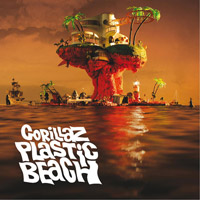
Plastic Beach
Virgin
I don’t think anyone could have predicted that Damon Albarn would have gotten so much mileage out of the Gorillaz concept. Yet here we are on the third album (not counting the remix records and other spin-offs) of the cartoon band that’s so real they’re beyond fake. While it’s not really that groundbreaking to put together a genre spanning line-up anymore, you still have to admire the pluck to put the Fall’s Mark E. Smith on the same album as Snoop Dogg. Then there are also turns by Lou Reed, De La Soul, Little Dragon and the Clash’s Mick Jones and Paul Simonon among others. The beauty about the Gorillaz’s concept is that it’s flexible enough to accommodate disjointed weirdness, but manages to make it sound unified. It’s almost unfair how effortless Albarn and company make this all seem. There’s not a weak track among the bunch and there are countless moments that are breathtaking in their execution.

Dark Night of the Soul
Capitol
I’m not even clever enough to put together a line-up of Danger Mouse, Mark “Sparklehorse” Linkous and David Lynch. But had I managed to stumble upon the idea, this record is exactly what I would have wanted to happen. The album is the perfect mix between Danger Mouse’s ’60s-influenced atmospherics and Linkous’ surreal pop sensibilities. It’s also perfectly cast, letting everyone do what he or she does best, only shot through a SparkleMouse—or is it DangerHorse—filter. It’s also serves as a tribute to Linkous and vocalist Vic Chesnutt, who passed away before the release. The record was delayed by legal wrangling, but it was well worth the wait.

I Learned the Hard Way
Daptone
One of the biggest surprises of I Learned the Hard Way is that it isn’t a hard-charging soul record. Instead it reveals the band and Jones to be in a relatively subdued mood. Rather than tearing through the tales of love and life gone wrong, Jones is melancholy and reflective, adding an unexpected gravitas. As a result, when the tough strutting Jones re-emerges on “Money,” it doesn’t really work in the context of the record. It will kill live, but here it’s a bump in the road. It’s nice to see that the introspective Jones is just as engaging as the soul shouter. If she indeed did learn the hard way, the lessons were well earned.

Banjo Forever
Red Bird
This multi-headed hydra of a twee-folk orchestra released two records this year, Banjo Forever and the best self-aware title I’ve heard in ages, Twee As Folk. I haven’t heard Twee, but I imagine it continues on the quirky path laid down on Banjo Forever. Super Desserts trade off between vocalists and manage to cram what seems like a thousand instruments on a song, yet it never sounds cluttered or confused. Lyrically the songs are heartbreaking little narratives that hide behind a smile.

The Galaxy Party
Vortex Gang
I randomly discovered this band while perusing the website of Flotation Walls, the creators of my favorite record last year, Nature. It took one YouTube performance of “Bottom Of The Sea” and I was done. The song, and the record for that matter, is like a chocolate-covered rock. The sweet vocalizing and harmonies and catchy tunes disguise some dark undertones. It’s like a time-released shock bomb. Or a sugary drink that you don’t realize has knocked you on your ass until you stand up.

Talking to You, Talking to Me
Vanguard
The Watson Twins may be the best reason to never assume anything. After their work with Jenny Lewis on her first solo record and their own Fire Songs, it was safe to assume that they were firmly country-tinged. So where the hell did this record come from? Talking to You, Talking to Me is a sultry, trip-hop-ish soul record that has more kinship with Adele than with the No Depression crew. After Fire Songs being completely underwhelming, this record was one of the biggest and best surprises of the year.

Tempest Past
self-released
This is a taut singer-songwriter record that’s almost entirely nothing but Desch’s guitar and vocals. Yet the way the songs draw you in, you don’t notice the absence of other instruments. Instead, you’re caught up in the quiet confessionals, romantic longing and the search for answers to questions that may not have answers. In the wrong hands it would be a navel-gazing mess, but Desch infuses even the quiet moments with an undeniable power.
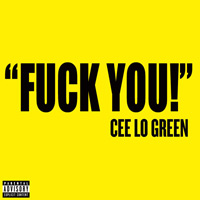
“Fuck You!”
Elektra
“Fuck You!” was the leftfield hit of the summer, a song that was spread via YouTube before an official video or radio-friendly edit could be released. The terrifyingly versatile Cee-Lo delivers this Motown-baptized tune with a wink, a smile and middle finger held high. It even got the middle-America mark of approval with a Gwyneth Paltrow version on Glee. Rarely has romantic dysfunction been so groovy.

“Not In Love”
Fiction
On paper there’s nothing about this song that makes sense. Yet from the second Smith’s voice cuts through, all you want is a whole collaboration album. Instantly more memorable than the past couple of Cure records, it’s electro-goth for the now generation.

“Tightrope”
Wondaland Arts Society/Bad Boy
Janelle Monáe seemed to be a promising freshman who would forever be stuck in “alternative” R&B purgatory. That was until the James Brown–channeling “Tightrope” melted transistor radios and late-night talk show stages. At home on both Top 40 and urban radio, the giddy dance number is simultaneously futuristic and retro—much like Monáe herself. Props to Diddy for not only recognizing her talent, but sticking with her.

“Cousins”
XL
This galloping stomp of a song stopped me in my tracks when I saw them perform it on The Tonight Show. All I could say was “Damn, they really figured it out.” The song seems like it’s on the verge of exploding at any second, but they manage to hold onto the reign and deliver one of silliest, yet most satisfying, hooks of the year.

“Stylo”
Virgin
Holy crap! This song would be enough with just the slow burn combination of 3D and Mos Def. Then Bobby Womack’s vocal slams in like the voice of God and you’re holding on for dear life. I’m always torn between shouting, dancing or pumping my fist, so I just do all at once.
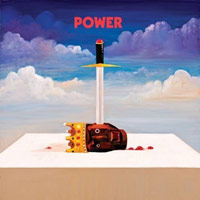
“Power”
Roc-a-Fella/Def Jam
At this point, I almost want to boost Kanye solely out of spite. Yet as long as he keeps delivering the goods like this, I have more than enough reason. Enough cheek to sample King Crimson combined with an insistent drum track, it’s the personal anthem you didn’t know you needed..

“Won’t Back Down”
Interscope
This song almost single-handedly erases the drug-hazed anthems from the past few albums. This track is nothing but straight spitting. In hip-hop terms, Em is rapping so hungry it’s like he hasn’t eaten in years. I damn near broke my rolly chair the first time I heard it. Then almost every time after that.

“Katy on a Mission”
Rinse
Dubstep is in an interesting place as it’s straddling both the mainstream and underground. This track, produced by underground hero Benga, shows that that you can do both without diluting the essence. It bangs in the club and is tuneful enough for drive-time radio.

“Whip My Hair”
Roc Nation
You may be groaning at seeing this listed, but there’s no denying the instant power of this song. Even Bruce Springsteen has done a version of the track. From the first play, the hook of “Whip My Hair” is stuck in your head, as if someone nail-gunned it there. And the cut bangs hard. Sure, it’s slightly annoying that the unnaturally precocious Smith has ventured into music, but if she can keep releasing jams like this, who cares?

“Hello Good Morning”
Bad Boy
At this point, it’s almost silly to keep complaining about Diddy. And this track, the official debut of Diddy’s trio, Dirty Money, shows that when he’s on, he’s on. This dark, dubstep-influenced club shuffle shows that, if nothing else, Mr. Combs has excellent taste in electronic music. But beyond that he can put a tune together, and if you can resist this once the breakdown drops, you’re a better man than I.

“Ibiza”
Red Bird
This song needs to be a minute longer and it would be perfect. As it is, “Ibiza” teeters on brilliance. It’s such a simple song in lyrics and construction, but it rings so true that it cuts to the bone.

“Creature”
self-released
I regret that I haven’t picked up the album yet, but this single will tide me over until I get my act together. Continuing the evolution towards a more even balance of intricate rock with poppy vocals, it’s like the best parts of Mike Patton’s brain exploded on a track. Add to that one of the most vocally articulate lead singers and you have one of the best songs to sneak onto radio in ages.

Raw Power: Deluxe Edition
Legacy
Who would have imagined that Iggy and the Stooges’ Raw Power would become the Blade Runner of music. The original 1973 issuance was famously mixed by David Bowie, but many felt that it lacked punch. In 1997, Iggy got the chance to remix the record and “correct” the weaknesses of Bowie’s mix. The result was violently loud, and many felt it stripped away the subtleness. Now the Deluxe Edition restores the Bowie mix but in a remastered form that meets the ’97 version halfway. It’s now a knife fight of a record that has its pinkie up. Add to that the bonus live show and it’s a vital revisitation of the Stooges’ legacy.

The Promise
Columbia
I’ve never been a particularly big Springsteen fan, but these past few years of reissues projects have drawn me in. There’s something about the hunger of the early days and the undeniable performances. And this collection of 21 unreleased songs from the Darkness on the Edge of Town sessions showcases the potent and prolific power of the Boss. While these songs may be old-hat for diehards, for the casual fans, this helps to fill in the blanks and shows in sharp detail why Springsteen is so revered.

Next Stop... Soweto, Volumes 1 and 2
Strut
As a longtime music fan, sometimes it’s hard to be amazed. With seemingly every song ever made only a mouse-click away, it takes something special to stand out. The British-based Strut label is scarily amazing. These two volumes, out of a three volume set, explore the underground South African music scene of the ’60s and ’70s. Considering the chilling effect apartheid had on the country, just the fact that these songs exist is astounding. And considering that most of these songs only appeared on small 45 runs, who would think that they’d reappear almost 50 years later?

“Na Poi” Batch
Knitting Factory
Knitting Factory is re-releasing the whole shooting match in bite-sized portions. But since he has 45 albums to his name some things take on a relative meaning. The Na Poi Batch consists of 14 albums, 11 of which were released between 1975 and 1976. Zoikes! This batch clearly shows him and Africa 70 on some next-level groove.
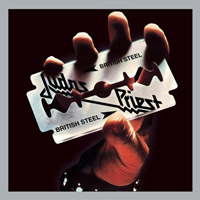
British Steel
Sony
While the sound of metal is certainly different these days, this is the album that helped break it from the last remains of its blues roots. But forget all the technical stuff, this is the record with “Breaking The Law!” This reissue also features two bonus songs and a live CD from the British Steel 30th Anniversary tour, which shows both the band and album are still vital.

Disintegration
Rhino
Arguably the last great Cure album, this three-CD version features both a second disc of instrumental demos and a live disc of the album in sequence. It’s the type of exhaustively nerdy collection that makes the fanboys and gals swoon. But even if you’re the type who didn’t place at least three of these songs on every mixtape for that special someone, it’s a multi-faceted look at a band that often gets dismissed as one note.

Value City Arena, April 7
Columbus
While the jury is still out on whether he’ll be the next great whatever, there’s no denying that for the past year the hype behind Drake has been deafening. So the expectations for his first major tour this past spring were fairly large. But the X factor was that his full-length debut wasn’t even close to being released yet. The majority of his hype was from a couple of self-released mixtapes and a slew of guest appearances. So what would he do? Amazingly, he rocked the stage for a little more than an hour—something that even established hip-hop stars can’t always do. Backed by a live band and a DJ he tore through his guest verses, his few officially released solo songs and tunes from his then unreleased album with the style and confidence of a vet.

Axis, September 1
Columbus
Words can’t totally explain the Big Freedia experience. An over six-foot tall man with a commanding Baptist preacher style voice, Big Freedia prefers to have the pronoun “she” attached to any discussion. One of the leading ambassadors of the New Orleans birthed bounce, a style of call-and-response ass-shaking dance music, she’s the type of thing that needs to be experienced live. Unfortunately, the turnout was rather anemic, but that didn’t stop Freedia from rocking as if it was a jammed-packed venue. It was a master class in how to give your all no matter what the situation. Add to that some physics-defying booty-shaking by a back-up dancer and Freedia herself and it was the type of show where everyone who was there went to their social networks and declared, “Man, you should have been there!”

Outland, October 16
Columbus
I had been lucky enough to see the classic line-up of GBV a few times before the band went through its clockwork line-up changes. So while I loved every time I saw them, I didn’t realize the deep longing people had for that period. But when I heard about the mania that surrounded the reunion tour, I knew that these shows would be something special. Boy and howdy! It’s as if no time had passed at all, and they played just about every song you could want to hear. But more impressive was the fan reaction. Beers were held aloft, singing was full voiced, and strangers were clasping shoulders like long lost brothers. I’ve never had that many random people hand me beers unprompted. It was less a show and more like a tent revival.
